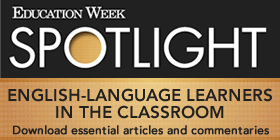Over the years, educators have asked me the same questions over and over again about how best to educate English-language learners. Even though the research and best accepted practices regarding these students have become clearer and clearer, the development of a workable, comprehensive plan remains only a school or district compliance document, not a dynamic program. It is as if we are looking for a silver bullet. The thinking is that a magical solution should come in the form of a program in a box.
First, let me tell you there is no silver bullet. There is only sitting down and coming to agreement on what the research says to do and then following through with it. In addition, we seem to think that if we test these kids more, the answer will appear. These students do not need more testing; they need the best teaching strategies available. These identified best strategies must be used in English-language-development (ELD) classes, in the core instruction, and for interventions. I believe that educators have the answers; however, it is just too overwhelming for them to turn those answers into a comprehensive program.
For years, educators expected a publisher’s program to help them teach English-learners, once again looking for the silver bullet. Then some elementary schools started leveling not only for ELD classes, but for all subjects, removing students from their homeroom classroom. By the time the students made it back to their homeroom at the end of the day, they hardly recognized their teacher. (So much for getting to know your students well.) Some districts established newcomer centers, some developed dual-immersion programs, others ignored the situation, and some teachers just talked louder in their classrooms.
Now is the time to gather the best educators in your school district and have a long conversation about developing a dynamic plan to educate all English-learners."
For educators who struggle with one of America’s most daunting social-justice issues, finding the answer on how best to educate English-learners will continue to be their challenge. The educator Larry Cuban, in his 2008 book Frogs Into Princes: Writings on School Reform, writes about the importance of framing a problem correctly so it can be analyzed correctly. He describes two kinds of organizational problems: “Tame” problems are familiar situations for which educators have a large repertoire of solutions. “Wicked” problems are ill-defined, ambiguous, and packed with potential conflict. Wicked problems can only be managed, never solved.
Even though educating English-learners appears to be a tame problem, it really is a wicked problem because of the overlays of poverty, the immigrant experience, the lack of understanding regarding language acquisition, the focus on state test scores, the misunderstandings around parent support, and the yin and yang of the politics of educating English-learners. Add to this mix publishers who claim to have the curricular answers, and the program-improvement movement, which has imposed a formula on local schools and districts, and you have a poor recipe.
So let us be clear about what educating English-learners is not about. It is not about speaking English louder in the classroom. It is not about retention or test preparation as interventions. It is not about all those brown kids sitting in rows with their uniforms on while few hands are raised. It is not about blaming the parents or the kids. It is not about politicians, school board members, or special-interest groups planning for the education of English-learners.

What is educating these students about? It is about the educators doing the right thing. It is about identifying the best research and reading it together. It is about consensus around what the research proposes in order to develop the criteria. It is about using these criteria to develop the plan. It is about identifying the most effective and appropriate instructional strategies, and then selecting or developing the curriculum materials to match them. It is about a comprehensive professional-development program that supports teachers during the implementation stages and provides for discussions of what worked and what did not. It is about having the flexibility and strength to stop using or carrying out a poor practice in order to develop a better practice. It is about the best core instruction. It is a planned ELD program. It is about using the student’s primary language as an instructional tool. It is about good dual-immersion schools.
Now is the time to gather the best educators in your school district and have a long conversation about developing a dynamic plan to educate all English-learners. The motto for this plan must be “no excuses, just do it.” Even if you have a plan, is it the best plan? Remember, a wicked problem never goes away, but it does require vigilant management.




